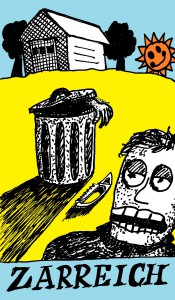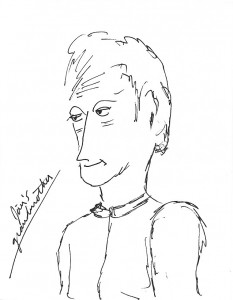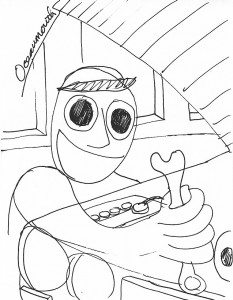Homage Part 2: The Zarreich Enigma
 As I did with my previous University of Mars post, I culled this essay from its original sortmind.com page. With the advantage of further perspective, I’m editing it considerably from the 2006 musings I made after scanning and editing the typewritten 1982 rough draft. Zarreich was an insanely fertile experiment, disjointed, psychically over the top, and often embarrassing. At the time I considered it a literary novel, but I think it would really be classified “Horror.” In contrast to The University of Mars, it’s faintly possible I might return to this one day and make it into a modern novel.
As I did with my previous University of Mars post, I culled this essay from its original sortmind.com page. With the advantage of further perspective, I’m editing it considerably from the 2006 musings I made after scanning and editing the typewritten 1982 rough draft. Zarreich was an insanely fertile experiment, disjointed, psychically over the top, and often embarrassing. At the time I considered it a literary novel, but I think it would really be classified “Horror.” In contrast to The University of Mars, it’s faintly possible I might return to this one day and make it into a modern novel.
The Nightmare City of Zarreich
An adolescent is sent to live in a small town with his grandmother, only to discover that all his memories have been wiped. He panics, commits a murder and saws up the body, then finds himself a member of a secret commune remembered only in dreams.
In the spring of 1981 I wanted to create a vast psychological novel that would go far beyond my first four novelistic ventures. That spring saw my final tired work on my endlessly revised third novel, Akard Drearstone, and the abandonment of my fourth, The University of Mars, which at the time had reached a dead end.
The nightmare city of Zarreich had been kicking around in dreams for years. In preparation for the novel I typed out one hundred more “Other World” dreams I’d recorded over the previous decade, dreams that seemed to point to the existence of a concrete alternate world accessed through dreaming. Integrating a huge number of these dreams into the novel–I think twenty-two made it in–was a severe challenge to organizing any rational plot.
This April 1981 dream was the seed for the novel:
1) The village in the sunny valley (arranged as: plain, valley, hill, 2nd plain–the first valley is the quaint village–the 2nd plain is the magnificent city built out of nothing.)
2) Into this I come, a Jim Piston character with my .38. I live in the first valley with my grandmother. But a guy next door strikes me as evil and so I shoot him–several times–but though I know I am doing damage he keeps standing in the doorway laughing. In paranoia I keep loading my gun and firing at this guy. In the kitchen. Finally I say to myself: “C’mon, you’re acting just like Jim Piston now.” [Jim Piston is the sociopathic bass player in Akard Drearstone.]
There must have been a lot more force to this dream than the above indicates, because the fifty-five pages of Chapter 1 amplify it enormously: Jim’s amnesia and mental confusion, his forbidden romantic yearnings, his murder of the jokester punk Steve Dorch, and his botched suicide attempt. Looking at the original notes I’m struck by how few notes there are for Chapter 1. It apparently blasted out uncontrolled, and afterwards I must have tried to rein the story in with more detailed plot notes.
Worsening a Rough Draft
I completed Zarreich in March 1982 and by December, after its censor-breaking exercises had enabled me to finish a successful Draft 2 of The University of Mars, I was ready to revise the novel. But instead of truly exploring the questions Zarreich raised, I stifled them.
I cut down the 363-page rough draft to a 154-page version which I retitled The Galaxies Groan Within. But a later rereading of both works astounded me with how rich Draft 1 was and how much of that wealth I’d abandoned in making Draft 2. The second draft Galaxies was astonishingly inferior to the wild, scary Zarreich. I’d never before worsened a novel in a second attempt, and it was sobering to see how it’s possible to leech the life from the huge psychic energies of a first draft.
So, instead of the usual view that the last attempted draft must represent the final version, I now consider the rough draft to be the true novel. Despite its many flaws, something real happens in Zarreich.
Obsessive Editing of Typewritten Draft 1
 So I decided that instead of merely scanning the rough draft for archival purposes, I’d also proof it and consider Zarreich a finished, albeit unpublishable Novel Number Five.
So I decided that instead of merely scanning the rough draft for archival purposes, I’d also proof it and consider Zarreich a finished, albeit unpublishable Novel Number Five.
I wanted this version to be as close as possible to the typed Draft 1. My habit with typewritten drafts was to obliterate unwanted text with thick black marker to make the remaining text more readable. Interestingly, in volume two of William Patterson’s recent biography of Robert Heinlein, there’s a photo of Heinlein inspecting a draft of Stranger in a Strange Land, and you can see that he’s using this same method!
In any case, I considered those strikeouts and their accompanying black handwritten corrections to be the final first draft, and figured that all red corrections, including slashes down the center of the page to eliminate whole sections, had to be preparation for the second. So I ignored the red corrections, even if from an editing standpoint they strengthened a given sentence.
It was typical of the disastrous second draft consciousness that the red handwriting often sneers at the rough draft. For instance, Jim’s grandmother Emily says “Morning!” and Mr. 1983 circles that and writes “Bullshit!” to declare that the addled writer of Draft 1 must have been pandering to Emily’s unfathomable chirpiness. But why wouldn’t my character say whatever comes into her mind? Is “Morning!” really so objectionable?
But here’s where my obsessive side came into play: in not a few cases I intuited that a blacked out section was true to the spirit of Draft 1 and I keyed it into the text by painstakingly going over it (or behind it) with a flashlight to decipher the typed writing. This process was extremely time-consuming, so I usually ignored the shorter blacked out sections, assuming that most of them were actual editing improvements. But occasionally, especially when huge paragraphs were entirely blacked out, I wondered what lurked beneath them. Something to strengthen the story? Or something embarrassing to hide? Either got keyed in. I was usually on target with these guesses–so overall I feel I’ve retrieved the essence of Zarreich.
Of course I left all the serious chronology problems and logical contradictions stand. That’s all part of the game.
Suspicious Tone Changes in Part Two
Long after the completion of Zarreich, I declared the horror chapters 1-9 a Part One and the deliverance chapters 10-13 a Part Two; this was another way of trying to reframe the novel’s early power. The difference in tone between chapters 1-9 and 10-13 is striking, however. There’s a painfully obvious attempt to reverse the horrifying dream ride of the early Zarreich energy in the last four chapters, the letters written by the astral-bodied Jim shortly before his death.
These last four chapters attempt to placate the reader and redeem Jim. It’s not entirely unconvincing, but it’s hard to believe the messed up Jim of chapters 1-9 could suddenly be so articulate. Possibly his new perspective is valid, given his shooting, his ten-day coma, and his realization that he’s a Bishop about to be permanently exiled to the Other World, but still, a revision would have him bewilderingly discovering all these truths, not matter-of-factly recording them in a state of grace.
Chapter 12 revises Chapter 1 in that now we find that Jim had only rented a room from Emily Donne, a stranger, as opposed to the original plot of his coming to live with his grandmother. And so uncomfortable aspects of family and kin are removed and we can now skip to our happy ending. But when you require production of a happy ending, the novel is doomed. In fact, you’ll miss a true happy ending if one is possible. If you can present reality well, you transcend having to have choose either a comic or tragic stance. The novel, the art work, does that for you, because it’s real.
Revision, Roadblock, and Farewell on a Note of Semi-Interesting Trivia
 Believe it or not, the idea of revising this ancient novel has never quite died. But I have a feeling that if I actually tried, I’d either stumble across some of the same Galaxies urges to throttle the first draft’s unruliness, or blunder through all the chaos until I gave up. Also there is too much new writing awaiting new rough drafts. Do I have any true need to look back that far? Nevertheless, who knows?
Believe it or not, the idea of revising this ancient novel has never quite died. But I have a feeling that if I actually tried, I’d either stumble across some of the same Galaxies urges to throttle the first draft’s unruliness, or blunder through all the chaos until I gave up. Also there is too much new writing awaiting new rough drafts. Do I have any true need to look back that far? Nevertheless, who knows?
One aspect of Zarreich did find its way in the world. Chapter 6 was revised into the story “Roadblock,” published 2013 on the mobile social reading platform Ether Books. Here Jim, now an unemployed architectural school graduate, finds himself falling in with sixteen-year-old car mechanic Oceanmouth in a dubious trucking venture. In deep night in the rural south they encounter a massive roadblock, and road construction strikers who have the power to eradicate all the stars in the sky. Again, one of the Other World dreams.
Finally, my present day keyboarding personality, prone to mangling every other word I type, confident all will be edited to perfection down the road, is continually astounded at what I was once capable of. I’d typed well over five thousand pages of fiction by the time I came to Zarreich, and by then my two or three-fingered tactics on my 1940’s Royal typewriter were damn accurate. When I was rereading the typescript of Zarreich I came across a thick descriptive paragraph taking up three-fourths of the page, and I found myself rereading that paragraph several times, marveling that this particular piece of writing was remarkably lucid and powerful, especially considering that these were the first words out of my head. Then something else struck me about the paragraph–not a single typographical error anywhere. I suppose this shows that our neuroplastic brains, marinating in our digital clouds, are approaching the entire writing process a little differently these days.
Copyright 2015 by Michael D. Smith

Pingback:Novels Inventory, September 2011 | Sortmind Blog
Pingback:Shackism v. Sortmind, Part Two – Sortmind Blog – Michael D. Smith
Pingback:Novels Inventory, September 2011 – Sortmind Blog – Michael D. Smith
Pingback:The Damage Patrol Quartet: Four Stories – Sortmind Blog – Michael D. Smith
Pingback:A Brief History of The University of Mars – Sortmind Blog – Michael D. Smith
Pingback:Zarreich: The Unexpected Second Draft – Sortmind Blog – Michael D. Smith
Pingback:Zarreich – Publication at Last – Sortmind Blog – Michael D. Smith
Pingback:Asylum and Mirage: The Publication – Sortmind Blog – Michael D. Smith